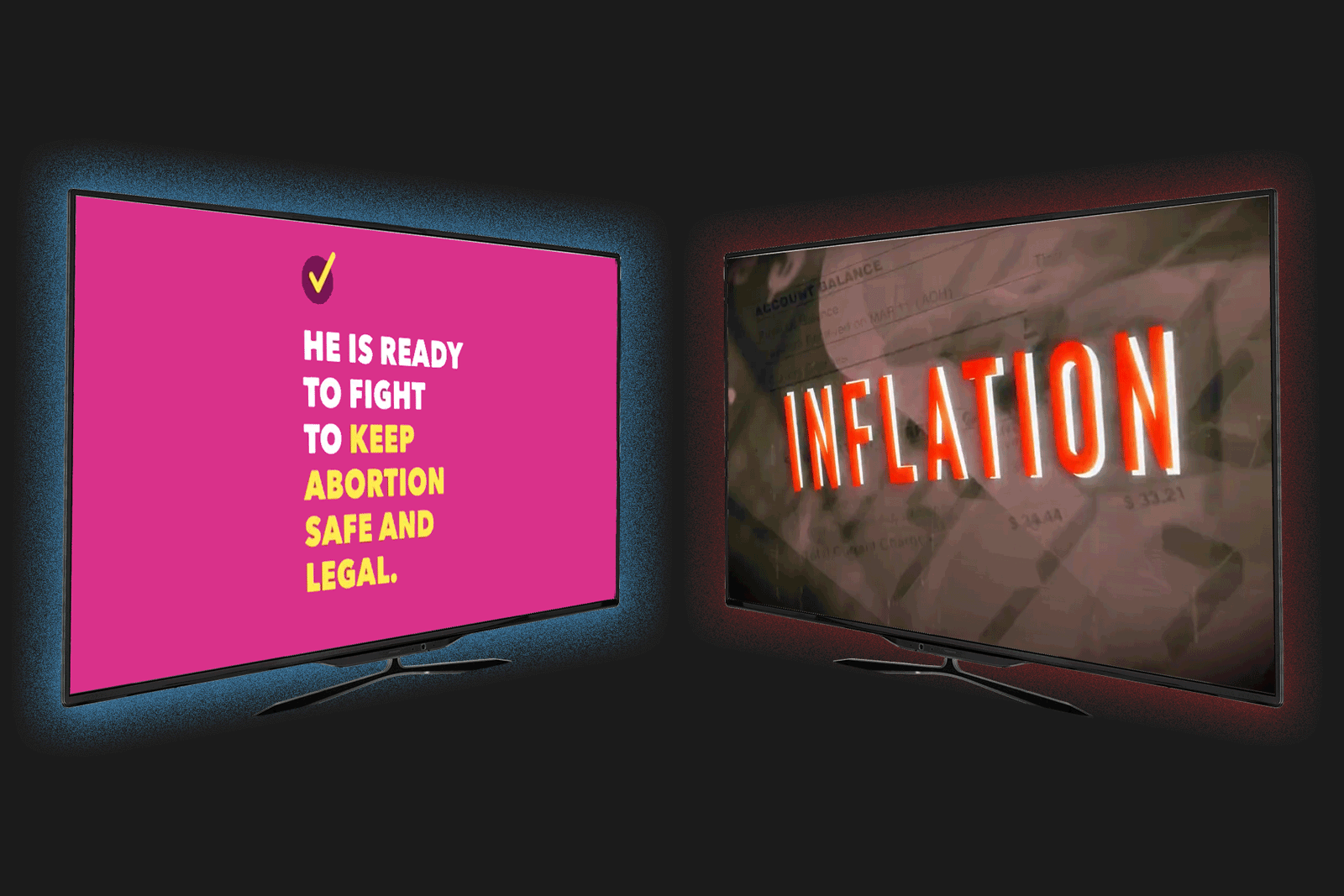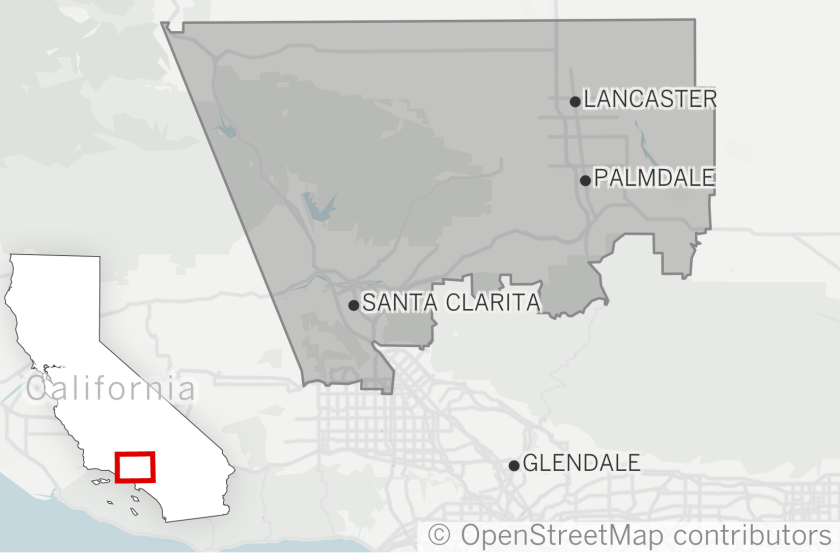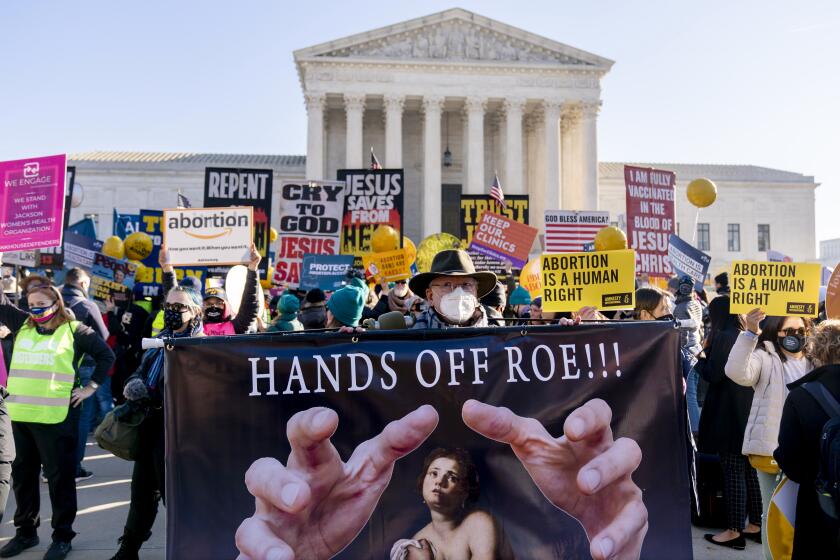The congressional election ads bombarding Californians show a sharp dichotomy in priorities — Democrats are laser-focused on abortion access, while Republicans zero in on inflation.
GOP candidates paint their rivals as out of touch with the financial hardships facing voters amid economic uncertainty not seen in more than a decade. After the overturn of Roe vs. Wade, many Democrats frame their opponents as antiabortion extremists in a state where voters overwhelmingly support abortion rights.
“It’s almost as if there are two separate elections taking place in two entirely separate versions of the political multiverse,” said Dan Schnur, who teaches political communication at USC and UC Berkeley.
“Republicans want the campaign to be about inflation. Democrats want it to be about abortion. There’s no real effort on either side to persuade voters to change their minds about an issue,” he said. “At this point, it’s simply a matter of the two parties trying to convince people that their issue is more important than the other side’s.”
And the sides are spending heavily to make sure their messages reach voters: In California’s 10 most competitive congressional races, the candidates, political parties and outside groups have booked more than $65 million in television airtime between Oct. 1 and Nov. 8, according to AdImpact, a firm that tracks political advertisements.
In those congressional races, 32 of the ads focus on inflation, gas prices and the economy; three-fourths of those are from GOP candidates or their allies. The 17 ads that focus on abortion are all from Democratic candidates and groups. A few Democratic ads touch on both abortion and the economy.
Midterm elections typically favor the party that is not in the White House, and Republicans need to pick up only five seats to take control of the House. But political experts say the Supreme Court’s reversal of Roe vs. Wade in June and the bans taking effect in many states have placed this election in uncharted territory.
In his coastal district straddling Orange and San Diego counties, Democratic Rep. Mike Levin stands in front of a Planned Parenthood office in an ad that touts the group’s endorsement.
“When it comes to choice, it makes a huge difference who you elect to Congress. I strongly support a woman’s right to a safe and legal abortion,” Levin says. “My opponent, Brian Maryott ... celebrated when the Supreme Court overturned Roe vs. Wade.”
Maryott has said that he believes abortion should be legal in the first trimester and that he would not support a national abortion ban. Like other Republican candidates, he does not mention abortion in his ads, but focuses on the economy. The multimillionaire highlights his work as a busboy, cook and janitor before he went into business and worked in finance for Wells Fargo.
“I know what it’s like to work and see your savings devoured by inflation and taxes,” Maryott says, adding that he wants to help working families and defeat “tax-raising” politicians.
Abortion and the economy are easily understandable issues for voters, said Kim Nalder, a political science professor at Sacramento State.
“Especially in midterm elections, these types of issues hit home. They are personal and can directly motivate people,” she said. “This is an odd year. These are monumental things.”
But she added that though inflation is grabbing headlines — gas prices in Los Angeles County recently hit a record high — economic concerns tend to be perennial issues, while the high court’s abortion ruling is unprecedented.
Despite Democrats’ decades of warnings that abortion access was at risk, many voters viewed such arguments as “a boogeyman under your bed that you didn’t take seriously,” Nalder said.
In the aftermath of the high court’s ruling in Dobbs vs. Jackson Women’s Health Organization that the U.S. Constitution does not include a right to abortion, states across the nation have moved to restrict or ban the procedure. Democratic strategists say that their most effective message, based on polling and focus groups, is highlighting Republican proposals for a nationwide abortion ban.
“Our voters are very angry about the overturning of Roe vs. Wade. And they’re angry at Republicans over it,” said Jenifer Fernandez Ancona, a co-founder of Way to Win, a group of liberal donors and strategists. “When you talk about abortion, it’s the most motivating issue for our voters, particularly women voters.”
Republican strategists agree that the abortion ruling is probably Democrats’ best hope in the upcoming election. “They really don’t have anything else to run on,” said veteran GOP consultant Rob Stutzman. “Dobbs has been a gift to them.”
Though the advertising is largely aimed at motivating the Democratic base, party strategists are hopeful that the issue could spur young and minority voters — who have traditionally turned out in lower numbers in past midterm elections — to go to the polls. The party is also aiming to draw some cross-over support from suburban Republican women.
Democrat Asif Mahmood, a physician who is running against GOP Rep. Young Kim in a district centered in Orange County, highlights such a voter in one of his digital ads.
“I’m a Republican because I don’t want the government interfering in my life. That’s why I’m so angry Republicans like Young Kim voted to put the government in charge of women’s healthcare decisions,” says a woman sitting at a kitchen table. “For me it’s not about being pro-choice or pro-life. It’s about the government messing with our lives and our private decisions.... Dr. Mahmood will keep the government out of our personal choices.”
An ad for Kim by the Congressional Leadership Fund starts with “INFLATION” in large red letters filling the screen and ends with “Asif Mahmood. We can’t afford him in Congress.”
Kim, like many of her fellow Republicans, is not limiting her message to the economy though it is a key focus. Her digital ads say the La Habra congresswoman would secure the border, reduce crime, lower gas prices and aid veterans.
Democrats are also not limiting their messaging to abortion and are running ads discussing climate change, democracy, jobs, healthcare, violence against Asian Americans, and the economy.
In one ad, family physician and Navy veteran Kermit Jones, a Democrat running to represent a sprawling district stretching from Lassen Volcanic National Park to Death Valley, talks about inflation and wildfires and not being beholden to a party. “When the Democrats talk about defunding the police and the Republicans want to criminalize abortion, I’ll stand up to both of them,” he says in the ad.
In another he accuses his opponent, Republican Assemblyman Kevin Kiley, of focusing on abortion over economics.
“As families struggle with inflation, what’s Kevin Kiley’s priority?” the ad asks, then says the Republican is focused on abortion bans. “Kiley would rather embrace a radical agenda to make a name for himself than solve the problems facing our families,” a male voiceover says.
Kiley supports allowing abortion in cases of rape or incest or if a patient’s life is in danger and would oppose a federal abortion ban, according to his campaign manager. Kiley, running in the Republican-leaning district, calls Jones a sycophant of House Speaker Nancy Pelosi, whom he blames for “the sky-high gas and grocery prices crushing our families.”
Jones, a voiceover says in a television ad, “will rubber-stamp her agenda.”
“The economy, of course, is a perennially high motivator in politics,” Nalder said. “Ironically, the political parties don’t have as much control in what happens in the economy as people think, particularly at the congressional level — the levers are few and far between.”
But that may not matter, she said, when voters are concerned about their economic stability around the time they’re filling out ballots.
“Whether it’s logical or not, we definitely feel it when gas prices jump again,” she said. “That especially applies to folks who aren’t paying as close attention to politics. They definitely have a gut-level response.”
The recent rise in gas prices, Schnur said, “creates an opportunity for Republicans that looked like it was slipping away a few weeks ago.” But he cautioned that the Roe reversal upends all conventional wisdom. “We’ve never seen a Supreme Court decision of this magnitude so close to an election. So there’s no way to predict how motivating [that] will be to voters.”
In the aftermath of the ruling, polling has consistently shown that most voters across the nation oppose the decision and believe abortion should be legal much of the time. In California, 7 in 10 voters support a measure to amend the state Constitution to add protections for abortion rights, according to an August poll by UC Berkeley’s Institute of Governmental Studies and The Times.
“In any other election year, we’d be saying it was a no-brainer, that [the economy] was going to drive the election,” said Stutzman, the GOP consultant. “Dobbs is this anomalous event that we don’t have good historical context for in how exactly it may alter classic midterm dynamics.”
“I guess the basketball analogy is the Republicans’ strength is they have the tallest center, so they throw the ball inside to him. The Democrats’ best player is a three-point shooter so they keep the ball on the perimeter,” he added. “Two different strengths, and we’ll see who has the better night in November.”
Read more election coverage

















